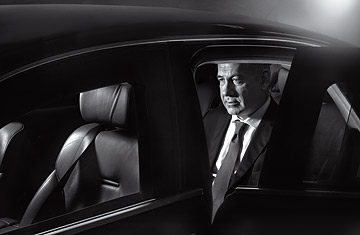
Netanyahu has history on his mind
(3 of 8)
Ronald Reagan, an idol of Bibi's, used to say, "Trust but verify." Bibi's attitude is "Don't trust. Verify." Like his father, he sees Jewish history as a succession of holocausts. Like his father, he has an almost mystical belief in the abiding power of anti-Semitism, as though it were more biological than cultural. "There was a sense that anti-Semitism stopped after the Holocaust," he says. "But it's been going on for millennia. And it's coming back with these challenges to the Jewish state." Others may wring their hands over Israel's militaristic global image. Not him. In the world according to Bibi, it is better to be victor than victim.
Greater Israel
Bibi presides over an Israel that is significantly more complex and diverse than that of his predecessors. It now has the second largest Jewish population in the world: 6 million, about half a million fewer than the number of Jews in the U.S. A quarter of Israel's population is Arab or non-Jewish. Israel tries to be both Sparta and Athens. It is a martial country that devotes 6.3% of its GDP to defense while being a haven for democracy and entrepreneurialism.
After the U.S. and China, Israel has the most companies listed on Nasdaq. Though that fact has helped Israel avoid the worldwide recession, not all is rosy in the Promised Land. Israel was founded by socialists and used to have the lowest income inequality in the world. Not anymore. It's expensive to live there. A cost-of-living protest in Tel Aviv last year saw hundreds of thousands of Israelis marching in the street. People there don't complain about the Palestinians or Iran; they kvetch about the economy. And when they are done worrying about their finances, they fret about fairness. Many religiously moderate Israelis complain about the political perks of the ultra-Orthodox (the haredim, or God-fearing). The ultra-Orthodox have enormous families and enjoy welfare benefits and state subsidies. Most men don't work but instead study the Torah. They're exempt from serving in the military, the most important national demonstration of shared sacrifice--a word not bleached of meaning in a country where everyone knows someone who has lost a son. Bibi's new coalition is likely to call for a universal draft, which would include the ultra-Orthodox, in part to appease religious moderates. Unity on the matter of Iran is just as shaky. Polls show that only about a third of Israelis support a unilateral strike on Tehran's nuclear sites. Another third oppose military action. And a third are not sure. If there is a strike, pretty much everyone would like U.S. support. No one argues over that.
The Iranian Exception
On the afternoon after we talked in Caesarea, I meet Bibi at his official residence in Jerusalem. The White House this isn't. It's an unmemorable modern building in a busy part of the city. Inside, one walks along paths that have not been swept, past unfinished construction and gardens that look untended. We sit in the courtyard outside his study, which has a naked concrete floor, some rickety chairs and an old couch. When Bibi signals that he's hot, a worker silently rolls out a creaky shoulder-height rotating fan that she places right behind his head. It is the opposite of formal.
